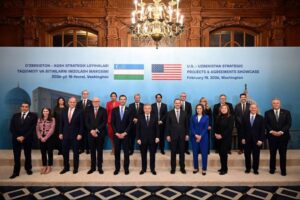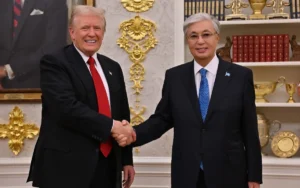Speech by Amb. to US Qin Gang at CGCC Chicago 2022 Annual Gala

Chicago, The Gulf Observer: The Chinese Ambassador to the U.S. Qin Gang delivered a keynote speech at the China General Chamber of Commerce – Chicago 2022 Annual Gala.
Here’s the full text:
Mr. Ni Pin,
Ambassador Baucus,
Ambassador Branstad,
Mayors,
Ladies and Gentlemen,
Friends,
It’s a great pleasure to join you in Wind City — Chicago. As globalization is meeting some head winds and China-U.S. relations are facing many challenges, it’s important for us to come together to discuss how to create more tail winds and avoid head winds for China-U.S. relations.
The theme today is “Reopen for our future”. What kind of future is China heading for? The 20th National Congress of the Communist Party of China which was just concluded in October has drawn the blueprint for China’s future development, which is, China will advance the rejuvenation of the Chinese nation on all fronts through a Chinese path to modernization. Chinese modernization has Chinese characteristics, such as a huge population, pursuit of common prosperity, coordinated material and cultural-ethical advancement. And it also reflects the aspirations of the entire humanity, such as peaceful development, and harmony between humanity and nature, which will benefit both China and the whole world. China takes the people’s aspiration for a better life as the starting point and final goal of its development, and the 1.4 billion Chinese people are pursuing common prosperity through high-quality development. It means hundreds of millions more people will become mid-incomers and the Chinese people’s super purchasing power will continue to be released. They wish to buy the world! China will stay committed to the fundamental state policy of opening-up and the win-win strategy of opening to the world. We will leverage the strengths of China’s enormous market, attract global resources and production factors with our strong domestic economy, and amplify the interplay between domestic and international markets and resources.This will position us to improve the standard and quality of trade and investment cooperation. We will steadily expand institutional opening up featuring rules, sectoral regulation, administration, and standards. We will upgrade trade in goods, develop new mechanisms for trade in services, and promote digital trade. We will make proper reductions to the negative list for foreign investment, protect the rights and interests of foreign investors, and foster a market-oriented, law-based and world-class business environment. We will never shut our door, but will only open it wider. I appreciate the U.S. business community for staying optimistic about China, and I hope that you will expand cooperation with China and further explore the Chinese market.
Friends,
China and the U.S. are each other’s major trading and investment partners. Our industries are deeply integrated and highly complementary. Over the past decades, our economic and trade cooperation has been very productive, benefiting the two peoples and promoting world development and prosperity. However, some people see China as “the most serious competitor” and “the most consequential long-term geopolitical challenge”, out of grave strategic misperception and misjudgment. Outcompeting China has become the purpose of all the China policies of the U.S. Because of this, the notion of national security has been over-stretched, economic and trade issues are politicized and weaponized, export controls, import restrictions, harsher investment reviews are imposed, as well as measures in tech decoupling, sectoral regulation and industrial subsidies. Over 1,000 Chinese companies have been added to various lists of export controls and sanctions. Many American companies have found it more difficult to do business with their Chinese partners, and Chinese investors are deterred from investing in the U.S. This line of policy has gone against market economy principles and trade rules, and is disruptive to global industrial and supply chains, hurting everybody. Some people argue for “competing responsibly”. But do such behaviors have anything to do with competing responsibly? If the world’s top two economies, which are deeply integrated with each other, get decoupled and cut off from each part in our bilateral relations, what consequences will our two countries and the whole world have to face? Is it responsible? I believe the answers are obvious. Suspicion, fear or hate should not stand in our way of pursuing economic growth, job increase, and improvement of livelihoods.
Not long ago, President Xi Jinping and President Joe Biden met in Bali and reached a number of common understandings. This important meeting has charted the course for future China-U.S. relations. In the meeting, both Presidents stressed the importance for China and the U.S. to manage differences and avoid conflict and confrontation. President Xi pointed out, mutual respect, peaceful coexistence and win-win cooperation are the right path for the two countries to stick to. President Biden said that the U.S. has no intention to seek decoupling from China, to halt China’s economic development, or to contain China. The two Presidents have instructed their respective teams to hold dialogue on macroeconomic policies and trade relations. We hope that their common understandings will be earnestly implemented, and our two countries can set the tone of interactions as dialogue and win-win cooperation, not confrontation or zero-sum game.
Friends, Chinese companies have a strong desire to invest in the U.S., and the potential is very promising. Over the years, Chinese investments have made important contribution to local economic and social development, which testifies to the win-win nature of our business cooperation. Faced with today’s difficult times, you have decided to stay put, keeping to your choice. Let me pay high tribute to all of you. I hope you will keep up confidence, defend your own rights and interests while observing compliance, contribute to local communities while making profits, and serve as a bond and bridge of engagements and cooperation between our two countries. I hope the U.S. side, both the federal and sub-national governments, will provide a level playing field for Chinese companies, welcome them, keep them here, and let them succeed.
Ladies and Gentlemen,
The American Midwest and the Heartland are often referred as the “flyover country”. The way I see it, this is a vast land with abundant resources, developed industries, and vibrant culture, and it has developed great cooperation and engagement with China. It is home to the first pair of China-U.S. sister cities (St. Louis and Nanjing), and has attracted many Chinese investment projects, such as Wanxiang and Fuyao. Many friends and organizations here have been working tirelessly for the ties and engagements with China.
Over the past 500 days of working here, I have visited many Midwestern states. I participated in the Global Economic Summit in Indiana and the Aspen Security Forum in Colorado. I had a test drive of the U.S.-manufactured new-energy vehicle at the North American International Auto Show in Detroit. I attended two China-U.S. agriculture roundtables, one in Iowa and the other in Missouri, and tried my hands with both spring farming and fall harvest. I visited friends old and new. I gave a class to young kids learning Chinese in Yinghua Academy in Minnesota, and one of them, Zoey Cardamone from Yinghua Academy has just won the world champion of “Chinese Bridge” Chinese show for foreign primary school students. I talked with students and teachers of many universities. I threw out the first pitch for St. Louis Cardinals. I have come to appreciate more how kind-hearted, hard-working and friendly the American people are, and how deeply committed the Midwestern United States is to interact with China. I look to our friends in the Midwest for more support and contribution to China-U.S. relations to achieve greater friendship and success.
Friends, COVID-19 has been with us for three years. It has caused great difficulties for travel. I know many of you want to go to China. I want to tell you that China is adjusting and optimizing its response to the pandemic in light of the situations, including in international travel. I believe that further adjustments will be made to facilitate travel in the near future. Let’s wait and see.
I look forward to playing Ping-pong with Connie Sweeris later, who was one of the first U.S. Ping-pong players visiting China 50 years ago, as we celebrate the 50th anniversary of “Ping-pong diplomacy” and pay tribute to Connie and her teammates for their pioneering and historic contributions. I remember we Chinese often say “Friendship First, Competition Second”. Even some people today may say no, and may say competition first, please don’t forget friendship.
I wish you a happy holiday season and happy New Year! Thank you!


